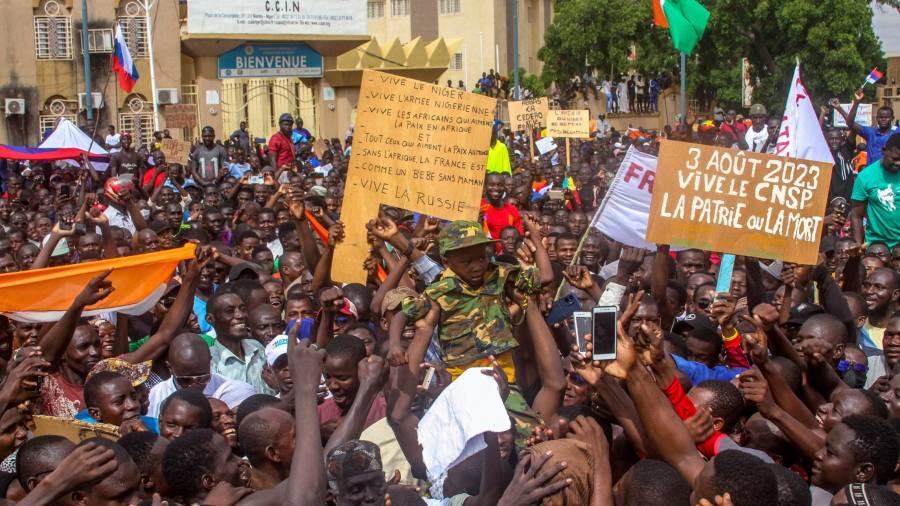Abdoul, a prominent civil society activist in Niger, said he opposed the coup that toppled the country’s pro-western president and set alarm bells ringing from Abuja and Dakar to Washington and Paris.
But nor does he agree with the threatened intervention to restore the deposed Mohamed Bazoum by Niger’s West African neighbours who have already watched governments in Mali, Guinea and Burkina Faso fall to military regimes.
“The coup against Bazoum is incomprehensible,” he told the Financial Times from Niamey, Niger’s capital. “But a huge part of the population also condemns any military intervention to restore the deposed president.”
Abdoul, not his real name, spoke on condition of anonymity due to the climate of fear and uncertainty that has gripped the capital since July 26, when the democratically elected Bazoum was deposed by Omar Tchiani, head of the presidential guard.
But the activist’s wariness about military intervention by the Nigeria-led Economic Community of West African States, known as Ecowas, reflected the dilemma faced by the regional body as it seeks to reinstate constitutional order. Ecowas has given Niger’s military regime until Sunday night to restore democratic rule or face the consequences, which may include “use of force”.
Abdel-Fatau Musah, Ecowas commissioner for political affairs, peace and security, insisted this week that the military option was the “last resort”. But a document leaked this week, as the group’s defence chief met to discuss their options, indicated Nigeria was preparing to amass troops in Sokoto state on Niger’s southern border.
Ecowas negotiators flew home empty-handed late on Thursday after being prevented from leaving Niamey airport and denied access to the coup leaders or to Bazoum. France, the former colonial power, as well as the UK, the US and others have evacuated civilians and some diplomats from the country.
That brought the prospect of foreign military intervention closer, according to a journalist in Niamey who also spoke on condition of anonymity. “We’re just waiting for Sunday and maybe in the night we’ll have something,” he said, referring to Ecowas’s deadline.
There were signs on Friday that mediation efforts had failed as the new regime cut diplomatic ties with France, Nigeria, the US and Togo by ordering their ambassadors to leave and recalled Nigerien diplomats.
The junta, which has revoked military deals that allow France to maintain a base and 1,500 troops in the country, has at the same time sought to bolster domestic support. It hosted activists this week to discuss Niger’s “territorial integrity” and invited trade unions, religious leaders and civil society groups to debate what it called the threat to Niger’s sovereignty.
Demonstrators in Niamey converged at Independence Square on Thursday, August 3, which marks Niger’s independence from France 63 years ago, to show their support for the National Council for the Safeguarding of the Fatherland, as the new regime is known.
The demonstration was organised by M62, a coalition formed last year with the aim of forcing the withdrawal of French forces that have made the country the hub of their operations in the volatile Sahel region after they were forced out of Mali and Burkina Faso.
“We’re talking about the immediate departure of all foreign forces,” Mahaman Sanoussi, M62’s interim co-ordinator, told the AP news agency.
Demonstrators were draped in Niger’s national colours of orange, white and green, and some waved Russian flags as they chanted slogans denouncing France, Ecowas and Nigeria’s president Bola Tinubu, who has led the bloc’s forceful response to the coup.
One ally of Bazoum said it was “easy to organise a mob” in the capital, an opposition stronghold. An estimated crowd of 8,000 people in a city of at least 1.5mn people did not reflect the true level of support for democracy, he added.
Marches in the cities of Zinder, Tillabéri and Agadez have also shown support for the junta, although as non-coup demonstrations are banned it is difficult for Bazoum’s supporters to take to the streets. Still, a video circulated on social media on Friday showing what appeared to be a large pro-Bazoum rally in the city of Tahoua, 500km east of Niamey.
Analysts say Bazoum’s popularity is limited despite being democratically elected two years ago. He belongs to a minority Arab clan and owed much of his electoral support to backing from the previous president Mahamadou Issoufou.
In office, Bazoum has been vocally pro-western in a region where such views have become unpopular. He had also staked out controversial liberal positions, such as banning ministers from taking multiple wives in a society where polygamy is routine.
The regimes in Burkina Faso and Mali rode to power denouncing France and the west as they sought closer ties with Russia. As Bazoum was feted by the west and received high-powered visitors including US secretary of state Antony Blinken, his support in Niger was always on fragile ground, analysts said.
Bazoum has remained under guard — a “hostage” to his captors, according to an opinion piece published in the Washington Post on Thursday in which he appealed to the west for help.
Niger has suffered rolling blackouts this week after Nigeria, which supplies up to 70 per cent of electricity to its neighbour, cut power. Ecowas has imposed other sanctions, with Ivory Coast suspending the import and export of goods, and the regional central bank closing its branches. Food inflation in the landlocked country, one of the world’s poorest, has accelerated.
Tchiani has described sanctions as “inhumane” and sought to deepen ties with Burkina Faso and Mali, which has employed mercenaries from Russia’s Wagner Group since 2021.
Ulf Laessing, director of the regional Sahel programme at the Konrad Adenauer Foundation, said it appeared the putschists had outmanoeuvred their opponents. “They’ve managed to mobilise the street and frame Ecowas as a foreign conspiracy,” he said.
A resident of Niamey echoed those comments: “People mostly blame Tinubu. They think he’s acting according to the will of France.”
Read the full article here




